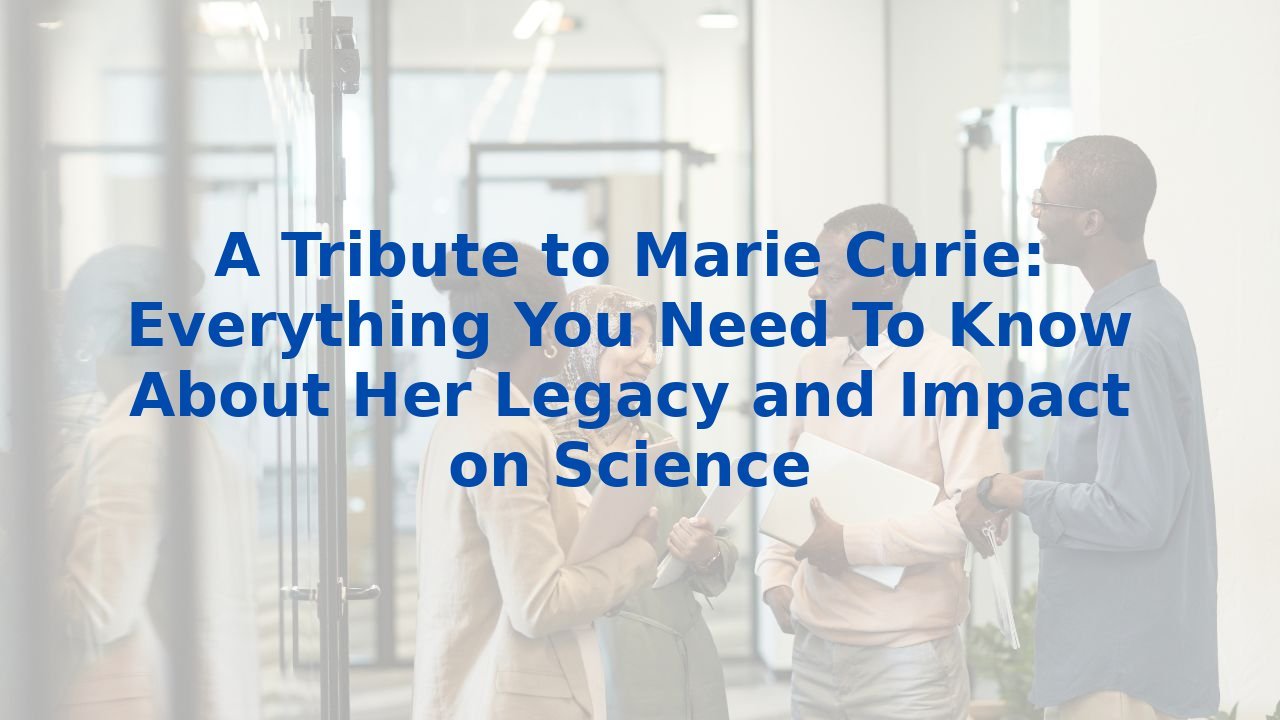A Tribute to Marie Curie: Everything You Need To Know About Her Legacy and Impact on Science
A Tribute to Marie Curie: Everything You Need To Know About Her Legacy and Impact on Science
Marie Curie, a name synonymous with groundbreaking achievements in science and the relentless pursuit of knowledge, has left an indelible mark on the world. Her pioneering research in radioactivity laid the foundation for advances in not only physics and chemistry but also in medicine, significantly changing the landscape of scientific inquiry. As we pay tribute to her remarkable legacy, it's essential to explore how her work continues to inspire and influence modern practices, including the integration of artificial intelligence (AI) to enhance efficiency across various fields.
The Legacy of Marie Curie
Marie Curie's legacy resides in her unyielding determination to uncover the secrets of the atomic world. Breaking barriers as the first woman to win a Nobel Prize and the only person to win Nobel Prizes in two different sciences, her achievements transcended societal norms of her time. She championed research in radioactivity, a term she coined, and her discoveries of radium and polonium ushered in revolutionary changes in medical treatments, particularly in cancer therapy. Curie's work set the stage for modern scientific inquiry, making her not just a pioneer in her field but a role model for generations of scientists, especially women.
Modern Science Meets Artificial Intelligence
In a world increasingly driven by technology, Curie's approach to scientific discovery echoes in the emerging dialogue around AI. Embracing AI as a tool for enhancing processes is becoming vital in organizations across sectors. By harnessing data-driven insights, AI can facilitate innovative research methodologies, streamline operations, and expand the horizons of scientific inquiry akin to Curie's groundbreaking efforts.
Enhancing Business Processes with AI
Just as Curie employed rigorous experimentation to push the boundaries of scientific knowledge, businesses today can integrate AI to refine their operations. AI tools can analyze vast datasets with speed and precision, uncovering trends and insights that might otherwise go unnoticed. For example, in research settings, AI algorithms can aid in hypothesis generation and data analysis, accelerating the scientific process.
Moreover, AI enhances decision-making. Intelligent systems can evaluate scenarios and predict outcomes with remarkable accuracy, providing leaders with the information they need to make informed choices swiftly. This ability to reduce uncertainty and improve decision-making efficiency parallels Curie's meticulous approach to her research—every decision grounded in data and discovery.
Training Employees in AI: A Path to Empowerment
Curie’s legacy is also a powerful reminder of the importance of education and training. As organizations pivot towards an AI-driven future, investing in comprehensive AI training for employees is essential. Training empowers teams with the skills needed to navigate this new landscape, instilling a culture of continuous learning and adaptability—attributes that Curie embodied.
When employees are well-versed in AI applications, it allows for more innovative ideas and projects to flourish. Each team member equipped with the right AI knowledge can contribute to improvements in product development, customer support, and even operational efficiency. By embracing a mindset of exploration and adaptation, organizations can cultivate resilience in an ever-evolving technological landscape.
The Collaborative Spirit: Pioneering New Frontiers
Marie Curie often collaborated with her contemporaries, sharing insights and fostering an environment conducive to innovation. Similarly, businesses integrating AI into their processes should promote cross-departmental collaboration. By breaking down silos and encouraging knowledge sharing, organizations can drive collective success. In a world interconnected by technology, the sharing of ideas amplifies the creative potential that Curie championed through her collaborative spirit.
Conclusion
As we reflect on the legacy of Marie Curie, we are reminded that progress requires both tenacity and the innovative spirit of exploration. Her impact resonates through contemporary scientific practices and the integration of AI within organizations. The lessons she imparted—perseverance, collaboration, and a commitment to knowledge—continue to inspire us to leverage technology to enhance efficiency and foster a culture of continuous improvement. In a world shaped by rapid advancements, let us honor her legacy by embracing the tools and training that empower us to push the boundaries of what is possible, just as she did.
For organizations looking to equip their workforce with AI skills that can elevate their capabilities and contribute to their mission, exploring comprehensive AI training programs is a critical step. The future of science and business depends on how well we embrace the lessons of the past while innovating for tomorrow.



